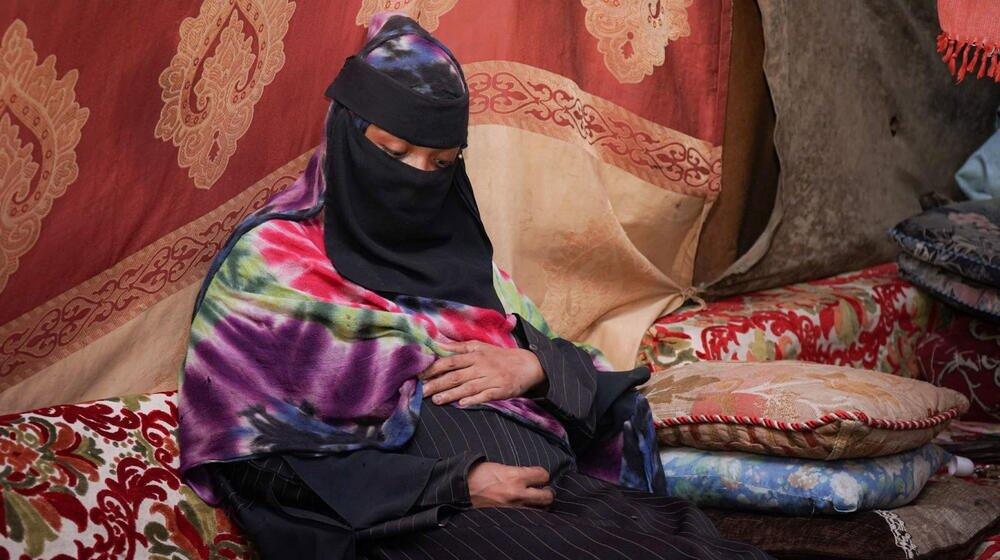HADRAMOUT, AMRAN AND TAIZZ GOVERNORATES, Yemen – An internally displaced woman named Hamsa* in labour arrived at Maifa’a Mother and Child Centre in Hadramout Governorate, known to provide free obstetric services, only to discover medical personnel gone and delivery services cut off.
Raisa*, ready to give birth to her first child, made it to Al Dhabr Health Centre in Amran Governorate but found the doors locked, no longer open around-the-clock due to lack of personnel. Hours ticked by as her pains intensified, but her family couldn’t afford transportation to another hospital.
When Amat* rushed to Al Khabt Hospital in Taizz Governorate in critical condition, she, too, realized that the obstetric care she had been counting on had vanished – and the nearest hospital that could save her and her baby’s life was precious hours away.
Funding streams dry up
UNFPA is the sole provider of reproductive health medicines and is leading reproductive health service provision in Yemen. But lack of funding has forced it to scale back humanitarian operations by 25 per cent since the beginning of the year. (Only 13 per cent of a $100 million appeal has been funded so far.)
In 2021, UNFPA reached 1.6 million women and girls with reproductive health services, assisting 151,000 safe deliveries and averting 344,000 unintended pregnancies with support to 127 health facilities and payments to 2,065 health workers.
But UNFPA has had to reprioritize, currently supporting 98 health facilities and four reproductive health mobile teams with the contributions of Canada, the Central Emergency Response Fund, the European Union, the Netherlands, Qatar Fund for Development, USAID’s Bureau for Humanitarian Aid and Yemen Humanitarian Fund.
Pregnant women pay a steep price
In Maifa’a, Hamsa had to seek help from a traditional birth attendant at home. The attendant did not realize she needed a Caesarean section and when she started bleeding heavily, had to be taken to the nearest hospital in Al Mukalla City 130 kilometres away. There the medical team managed to save Hamsa’s life, but not her newborn baby girl.
Al Dhabr Health Centre, where Raisa tried to obtain care, had provided free reproductive health-care services since 2018, with UNFPA supporting a female doctor and trained midwife. The clinic received up to 30 cases a day but after it started charging for services and medicines (beyond affordable for most), it saw two patients a day. Until it reduced working hours from 24 to 5, the clinic had never recorded a single maternal death. The clinic, which has lost specialists, has stopped testing for birth defects, providing post-delivery incubators and performing surgeries due to lack of fuel that could cut power mid-operation.
Raisa had to go to a midwife, who advised that her critical condition warranted a visit to the hospital. With no money for transport, she went to a second midwife, who also told her she needed emergency care. Raisa, who was 32, died before reaching a hospital; her baby daughter survived.
A health system in ruins
Only half of Yemen’s hospitals remain functional, and only one in five of them provide maternal and child health services. Nineteen of the country’s 22 governorates have six maternity beds for every 10,000 people, half of what the World Health Organization deems standard. In addition, an estimated 42.4 per cent of the population lives more than one hour away from the nearest fully or partially functional public hospital.
One Yemeni woman dies every two hours during childbirth from causes that are almost entirely preventable. An estimated 8.1 million women and girls of childbearing age require help accessing reproductive health services, including antenatal care, safe delivery services, postnatal care, family planning and emergency obstetric and newborn care. Among them are 1.3 million women who will deliver in 2022, of whom 195,000 are projected to develop complications that will require life-saving medical assistance.
A desperate search for help
Doctors at Al Khabt Hospital referred Amat to Al Mahweet City Hospital three hours away, where the family found out that it, too, didn’t provide the services she needed, including a blood bank. “On the way, I fainted,” she recalled. “I saw my whole life wiped out just like that.” Her husband panicked when her lips turned blue. “The moment I touched her, I felt they were going to be taken away from me,” he said.
Another two-and-a-half hours away was Al Jumhori Hospital in Al Mahwit City. The largest in the governorate, it is still being supported by UNFPA – and was an unconscious and barely breathing Amat’s last chance. After nearly six hours of travelling due to poor road infrastructure, mother and baby survived.
“It’s simple,” said midwife Afrah, who helped deliver Amat’s son. “When services are readily available, we can save lives.”
*Names changed for privacy and protection


